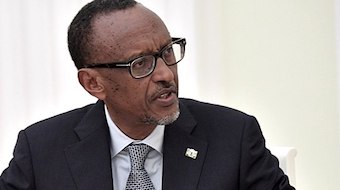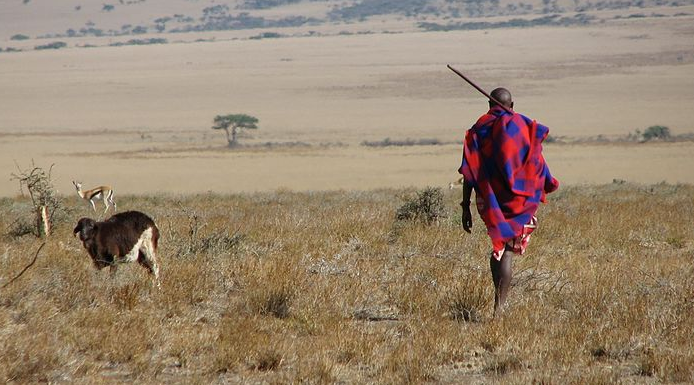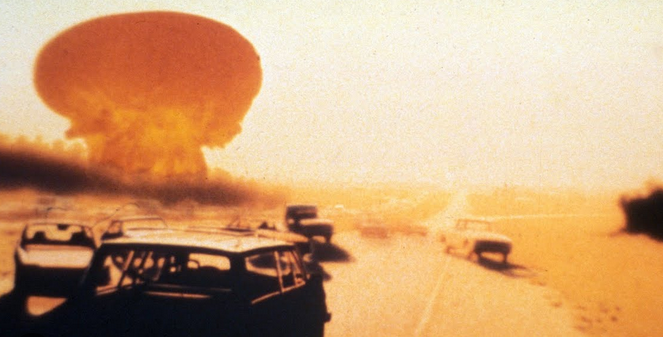Rwanda’s President Kagame. Photo: www.kremlin.ru via Wikimedia Commons
[Commentary]
Kagame rules a nation of sorrows. Rwanda’s traumatized people (Hutu, Tutsi and Twa) are too familiar with the idea of high costs. Rwanda’s centuries-old history, especially the last 60 years, is full of violent twists and turns that culminate in regime change, costly wars, revolutions, genocide, war crimes, crimes against humanity, and other gross violations of human rights.
Rwanda is in perpetual conflict. Regimes change, but power structures that build and maintain violent dictatorship remain intact, making it impossible for Rwandans to settle down, heal, unite and reconcile. Rwanda’s neighbors, within the so-called Great Lakes region, episodically have to absorb the costs of Rwanda’s endemic incapacity to put its own house on a sustainable, stable, peaceful, secure and equitable path.
Rwanda has imposed ever rising human costs of refugees, disruption, conflict, socio-economic catastrophe, environmental degradation, and insecurity to itself and to the Great Lakes region. It has been a net exporter of refugees, after: the 1959 “Hutu Revolution” spearheaded by PARMEHUTU; in 1973, Habyarimana’s military coup- later MRND “revolution” within the Hutu revolution; and, after the 1990 “Tutsi Revolution” whose vanguard was the Rwandese Patriotic Front (RPF).
On November 15, 2019, a rather anguished and frustrated Kagame promised to again inflict heavy costs on those who “destabilize” Rwanda. Simply put, when you have an alternative or dissenting viewpoint to his, you are destabilizing Rwanda. In Kagame’s world there are no innocent bystanders—only foes and friends. In his vocabulary, “high costs” could mean direct or proxy wars, assassination or jailing of political opponents, massive and systematic elimination of Hutus, killing of Heads of State—for example, Juvenal Habyarimana of Rwanda, Cyprian Ntaryamira of Burundi, and Laurent Kabila of DRC—or closing borders between with Uganda, and with Burundi. It could mean sponsoring regime-change through full blown wars such as the First and Second Congo Wars, wars of plunder, coup d’etats —the attempt in Burundi in 2015— and social disruptions in other countries.
Ironically, in an earlier speech a few weeks ago he castigated and riled against a certain government which he accused of being a minority that has held all economic and political power for too long, and justified why citizens have the right to rebel against it. This would have been a perfect description of Kagame’s own republic.
Over time Kagame has inflicted severe and irreparable damage to RPF and its army, RPA, by diverting them from the original core vision of ending the problem of refugees once and for all, uniting and reconciling Rwandans, ensuring security for all, democratization, equitable prosperity, and peace with neighboring countries. RPF and RDF, the army, have become brutal vehicles of maintaining Kagame’s absolutist rule by all means necessary.
Even a very brief and casual peep into memory lane will show you that the majority of political and military leaders as RPF and RPA captured state power in 1994 have been progressively eliminated, exiled, killed, jailed, marginalized or reduced to a miserable life that is aptly described in Kinyarwanda as gupfa uhagaze—English translation: you are still standing, but you are really dead—until you die miserably in desolation.
Attrition and degradation within the RPF, Government, and RPA (now RDF) have paved the way to give Kagame 99.99% of fake electoral victories, total closure of political space, rule through violent coercion at home, extreme risk-taking and belligerence in the Great Lakes region and abroad.
For example, none of the founding or senior political and senior leaders of RPF and RPA in 1994 can now be found among the top leadership of the party, government—executive, legislature, judiciary—or RDF. Through the instrument of many formal and informal intelligences under the original rubric Directorate of Military Intelligence (DMI), Kagame has killed the RPF and RPA as we know them. He has raised in their place disgraceful mutants of clappers, virulent propagandists scavenging social media as media experts, and a criminalized state that unleashes its assassins to kill. There is a ruthless military which Kagame uses as his personal property and sends to impossible and dangerous missions to fight unwinnable wars of destabilization in Burundi, DRC and Uganda.
By providing the trigger that fired off genocide against Tutsi in 1994—ordering the shooting down of the plane carrying Presidents Habyarimana of Rwanda, and Ntaryamira of Burundi—based on his pure calculation to get into power, Kagame imposed an unbearable cost on the Tutsi community. Kagame has also imposed an exorbitant cost on the Hutu community. He has marginalized Hutu to live as second class citizens, while many remain banished as refugees abroad. He has denied them the right to remember the hundreds of thousands of their own kith and kin that the regime killed in Rwanda, and later in the Democratic Republic of Congo after seizing power. Failure to account for the war crimes, crimes against humanity and “acts of genocide” in Congo—according to the UN Mapping Report, 2010—is the greatest hindrance to reconciliation and healing among Rwandans. It also fuels regional instability as the culture of impunity has become Kagame’s modus operandi.
The East African Community is now in an end game run in fruitless existence and a very possible ultimate death. The first death occurred due to another bloody dictator, Idi Amin of Uganda. Rwanda’s antagonistic regional posture has created a toxic atmosphere and imposed high costs that make collaboration and integration impossible.
When it comes to all forms of violence, Kagame is a man who has built a reputation of keeping overt and covert promises. To those he calls enemies, first among whom are those who supported him all the way into power, or his former friends, he promises that it is a “question of time” before he inflicts the ultimate cost to life: death. Thus, no sooner had the ink dried from his speech, than Rwanda’s Special Forces launched a stealth attack on Burundi last Sunday. A similar attack on Uganda is imminent.
Through internal weaknesses, corruption in the high echelons of political and military leadership, the Democratic Republic of Congo has effectively ceded south and north Kivu to Rwanda’s military, while Kagame consolidates these areas as staging ground for a protracted war of destabilization against DRC, Burundi and Uganda. Despite over 20,000 UN peacekeepers, an annual budget between 2017–2018 of $ 1.1 billion, MONUSCO has proved inept in keeping peace in eastern DRC for almost two decades, and has knowingly or otherwise opted to acquiesce to Kagame’s destabilization schemes.
Kagame has enormously benefitted from his violence industry. He will never abandon a business model that has made him rich, famous and powerful. Considered among the top wealthy global elite, he hobnobs with powerful interests which control the flow of money and weapons, and offer protection from accountability.
Kagame’s will looms large through a combination of manipulating the West’s guilt for the 1994 genocide, offering services against fellow Africans, and pure commercial interests with corporations whose leaders have become his lead counselors and spokespersons in building a fake “modernity” that imperils current and future generations of Rwandans.
His seamless connections stretch from Germany and Belgium which colonized Rwanda early in the 20th Century; France that was a strategic ally to those who committed genocide in 1994; the United States and United Kingdom that have accorded him an unconditional protective shield from accountability; the European Union that increasingly looks like his fiefdom; Russia and China, suppliers of weapons; Israel, supplier of population surveillance technologies; United Nations, which he calls “useless”; the World Bank and IMF, which adore him and bankroll his fake “modernization”; and, the African Union, which he considers “useless” except when he presides over it as a recent past chairman. All these provide him with a false sense of security and invincibility, making him more intransigent and prone to taking more bigger and violent bets.
As Kagame has warned, Rwandans and East Africans should expect an escalation of costs; notably loss of human life, destruction of wealth, and opportunities lost. This is the highest cost that all Rwandans and East Africans, current and future generations, have to bear unless they overcome, together.
A sinister and eerie silence once again pervades the Great Lakes region. A cataclysmic upheaval is inevitably in the making, unless prevented.
Dr. Rudasingwa is Rwanda’s former ambassador to the United States under Kagame’s government.
Contact: [email protected]












